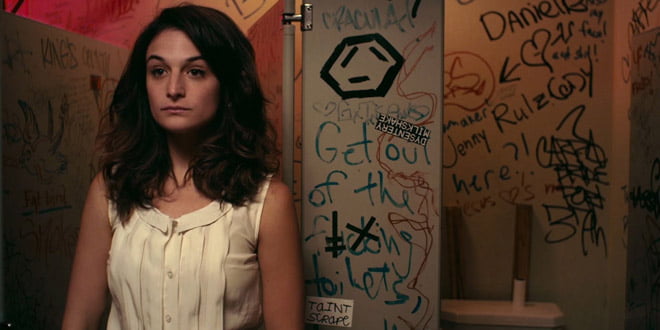There are moments in Obvious Child that are so pedestrianly sweet that they undermine the usual romantic comedy criticisms. One such moment comes when Max (Jake Lacy) warms a packet of butter for Donna (Jenny Slate). Slate’s acting instinct here to underplay the moment is what sells it, and it speaks to everything that is right about this film. Unfortunately, everything right is less than the wrong.
Donna works in a bookshop but her true passion comes at night when she does standup comedy. It’s there in the comedy club that one boyfriend dumps her while she meets another. One drunken night with him leads to a most unpleasant surprise—she’s pregnant. She decides since her life is such a wreck, the only responsible thing to do is have an abortion. On February 14. Valentine’s Day.
That’s the setup that has earned this film the “abortion comedy” moniker, though that really isn’t fair. This is no more a film about abortion than Brokeback Mountain is a movie about gay men. Yes, it’s a quality of the film, but the focus is really that of many indie comedies—20-something can’t get her life together and stumbles through a series of unfortunate events. Abortion plays into all of this, but identifying it foremost by that aspect would be like calling Fast Times at Ridgemont High the original abortion comedy.
That aspect is, however, played for laughs here and there, but generally dealt with the delicacy and maturity you’d expect. That isn’t the issue here. Strip that aspect away and you have a fairly traditional indie comedy with romantic comedy trappings. In that respect the film requires that it be funny, but it just isn’t often enough. Whenever Nellie (Gabby Hoffman) and Joey (Gabe Liedman) show up on screen they breath fresh air and laughs into the screenplay. Unfortunately, their arrivals are too sporadic. In between there are long stretches of tedious standup comedy that aren’t that funny. There is nothing wrong with a female standup comic being crude just like a male comic, but then there is nothing that makes it particularly funnier than when a male does it. It seems intended to shock the audience, but the art house theater I watched it with was mostly silent during these stretches.
There are other problems, too. Richard Kind gives a fine performance as Donna’s father, but it seems a role in search of a reason for being. He pops up now and then, but all the best material is left for Donna’s mother (Polly Draper). Maybe this is a commentary on the relationship between daughters and each parent, but they felt like directionless scenes that simply hang there.
If it seems I hated this movie, then perhaps I have oversold my argument. It’s not a bad movie as much as it is lackluster and forgettable. Slate is wonderful in the lead role and I was left wanting to see her in better work. Even writer/director Gillian Robespierre shows the promise of something greater down the line. Just not this movie. That much is obvious.

